The AMD 3rd Gen Ryzen Deep Dive Review: 3700X and 3900X Raising The Bar
by Andrei Frumusanu & Gavin Bonshor on July 7, 2019 9:00 AM EST** = Old results marked were performed with the original BIOS & boost behaviour as published on 7/7.
Benchmarking Performance: CPU Legacy Tests
3DPM v1: Naïve Code Variant of 3DPM v2.1
The first legacy test in the suite is the first version of our 3DPM benchmark. This is the ultimate naïve version of the code, as if it was written by scientist with no knowledge of how computer hardware, compilers, or optimization works (which in fact, it was at the start). This represents a large body of scientific simulation out in the wild, where getting the answer is more important than it being fast (getting a result in 4 days is acceptable if it’s correct, rather than sending someone away for a year to learn to code and getting the result in 5 minutes).
In this version, the only real optimization was in the compiler flags (-O2, -fp:fast), compiling it in release mode, and enabling OpenMP in the main compute loops. The loops were not configured for function size, and one of the key slowdowns is false sharing in the cache. It also has long dependency chains based on the random number generation, which leads to relatively poor performance on specific compute microarchitectures.
3DPM v1 can be downloaded with our 3DPM v2 code here: 3DPMv2.1.rar (13.0 MB)
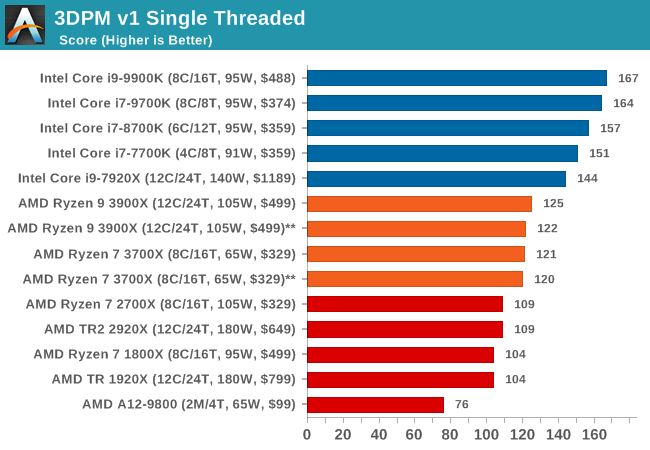
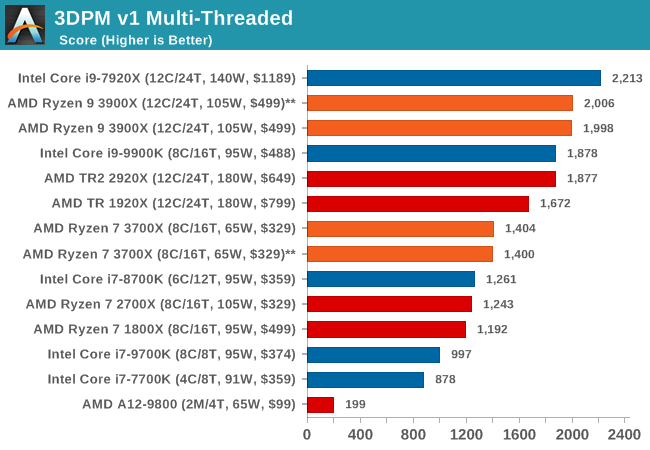
x264 HD 3.0: Older Transcode Test
This transcoding test is super old, and was used by Anand back in the day of Pentium 4 and Athlon II processors. Here a standardized 720p video is transcoded with a two-pass conversion, with the benchmark showing the frames-per-second of each pass. This benchmark is single-threaded, and between some micro-architectures we seem to actually hit an instructions-per-clock wall.
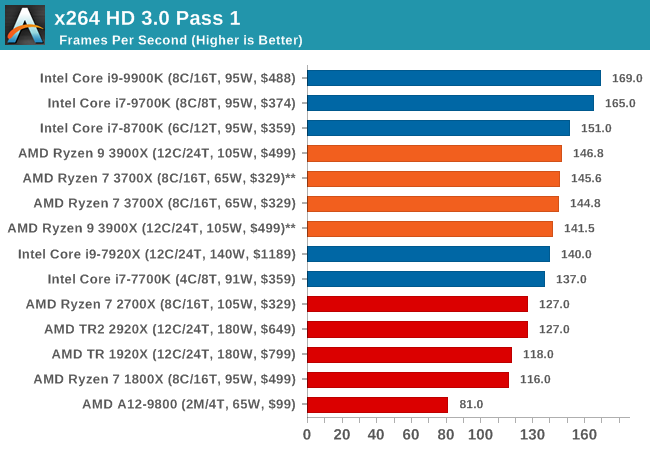
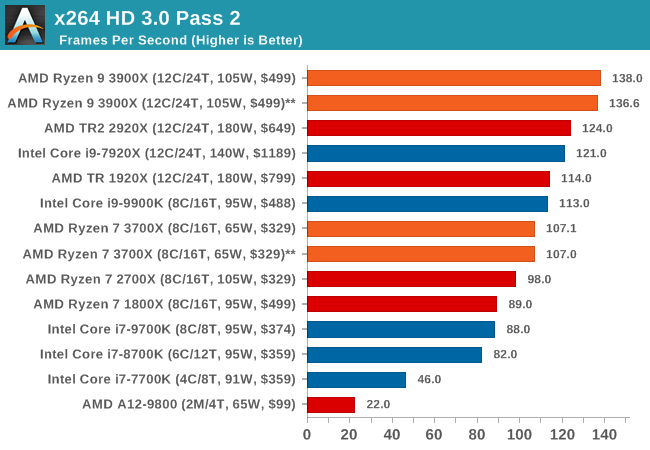
CineBench 11.5 and 10
Cinebench is a widely known benchmarking tool for measuring performance relative to MAXON's animation software Cinema 4D. Cinebench has been optimized over a decade and focuses on purely CPU horsepower, meaning if there is a discrepancy in pure throughput characteristics, Cinebench is likely to show that discrepancy. Arguably other software doesn't make use of all the tools available, so the real world relevance might purely be academic, but given our large database of data for Cinebench it seems difficult to ignore a small five minute test. We run the modern version 15 in this test, as well as the older 11.5 due to our back data.
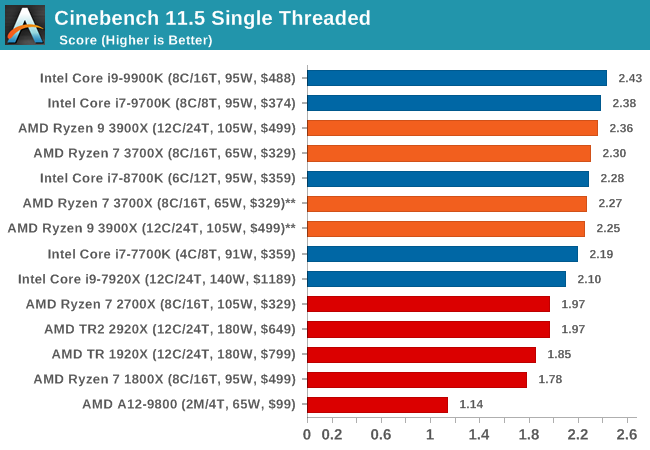
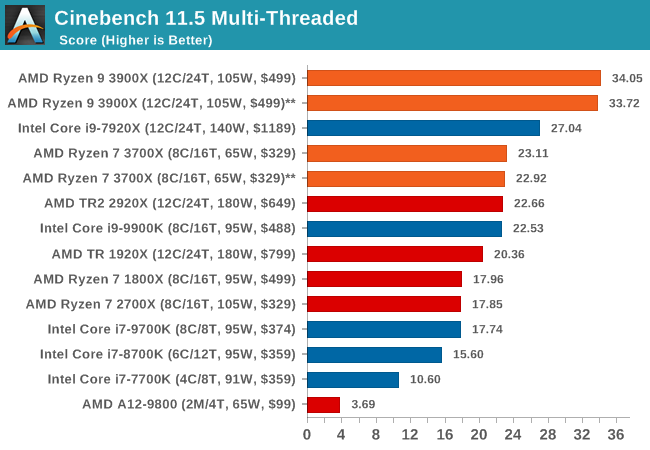










447 Comments
View All Comments
John_M - Sunday, July 7, 2019 - link
Yes. The integrated memory controller is on the IO die, which is part of the Ryzen SoC, not the chipset.BushLin - Monday, July 8, 2019 - link
Right now, there's no indication what CL / timings are applied to all the other systems. CL16 is indeed bottom of the barrel for DDR-3200, you would hope there's no shenanigans with Intel getting CL12 DDR-2666. Why not just run all the systems with the same DDR-3200, it's not like they can't do it.profiaudi - Wednesday, July 10, 2019 - link
Not to be too rude, but the IMC is on the io chipLet, not the chipSet. The chipset actually has an important role for the memory speed, in that a chipset defines a platform and a platform imposes requirements on the power supply and trace routing. While the IMC in 3rd gen can handle 3200MT/s+ completely fine, it is guaranteed to do so only one X570. Anything older is a dice roll as the boards were not designed for such speeds (not a requirement for the older platform).waja - Tuesday, July 23, 2019 - link
Do you know george stevenson story?He earn 3657$ every month at home just working few hours on internet see more by open this connection and click home button.FOR MORE INFORMATION COPY THIS SITE.......... www.online-3.comAndrei Frumusanu - Sunday, July 7, 2019 - link
Just as note for those who haven’t been following: This review wasn’t written by our usual resident CPU editor, Dr Ian Cutress as he unfortunately the timing didn’t work out. We only had a few days time with the new Ryzen CPUs, as such, you might noticed a few bits and pieces missing in our article that we’ll try to address in the next hours and days. We’ll be trying to update the piece with more information and data as soon as we can. Thanks.Also huge thanks to Gavin Bonshor who actually did all the testing and collected all the data for this review, thumb up to him.
plonk420 - Sunday, July 7, 2019 - link
hoping a speedy recovery for him! loved his video with Wendell!loving the article, too. don't suppose you could test cross-CCX latency?
plonk420 - Sunday, July 7, 2019 - link
e.g. pcper.com/2017/06/the-intel-core-i9-7900x-10-core-skylake-x-processor-review/3/main interest is if it is low enough to be harnessed by RPCS3 (PS3 emulator)
ballsystemlord - Sunday, July 7, 2019 - link
CCX benchmarks would be nice.IF power benchmarks were also done last time and probably in the works.
shakazulu667 - Sunday, July 7, 2019 - link
Are Intel results with or without spectre et al mitigations?Ryan Smith - Sunday, July 7, 2019 - link
They are with Spectre and Meltdown mitigations. They are not new enough results to include anything for Fallout/ZombieLoad.